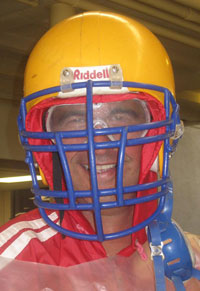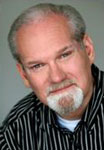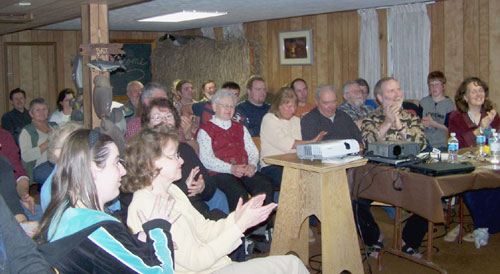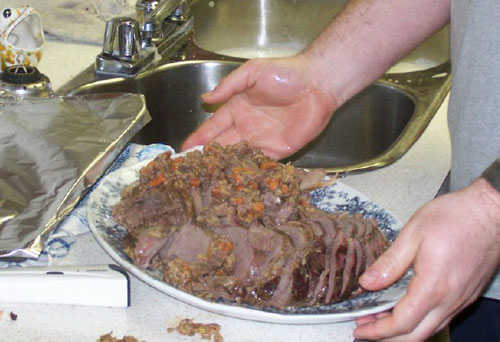17 Apr Closing of Pennfield UB
Pennfield UB church of Battle Creek, Mich., has been closed. The building has been sold and the funds will be forwarded for use in church planting.
(260) 356-2312
Pennfield UB church of Battle Creek, Mich., has been closed. The building has been sold and the funds will be forwarded for use in church planting.
Marvin Schwartz has been assigned as the new senior pastor of New Horizons UB (Rockford, Ohio) effective May 25. Wes Kuntzman will continue to fill the pulpit until May 18. Marvin is currently working towards his Masters degree at Huntington University. He was ordained in 2005 in the Church of the Brethren.
Anchor Community Church is working with nearby Grace Presbyterian church and several other Presbyterian churches in a Habitat for Humanity project. They have been raising funds for about a year, and are almost ready to start on the home.
 The most recent project involved collecting aluminum cans. The goal was to bury Todd German of Grace (right) in pop cans. The catch: Todd is 6’7″ tall. Everyone brought their pop cans to Grace on Sunday, April 13, to see if they could do it.
The most recent project involved collecting aluminum cans. The goal was to bury Todd German of Grace (right) in pop cans. The catch: Todd is 6’7″ tall. Everyone brought their pop cans to Grace on Sunday, April 13, to see if they could do it.
Members of Grace used pvc pipe and plasting netting to construct a seven-foot-tall pen. Todd put on his hunting boots, a rain poncho, and a football helmet, and in he went. Louise McCracken of Grace (and Todd’s mother-in-law), who is heading up the Habitat project, wrote:
“By the time he was covered up to his chest, we were out of cans…I thought. In came the channel 15 photographer, and my heart sank. Behind him, however, came many people from Anchor Community Church with many bags of cans. Plus, our pastor had held back her six or seven big bags. The cans were overflowing the top of the container, and Todd was completely out of sight! It was lovely!”
Todd, submerged in cans, used a piece of garden hose to breathe.
In the end, 28 huge bags of cans were hauled to Omni Source for recycling.
Ruby Parent, who served a total of 11 years as a missionary in Sierra Leone, passed away on Sunday, April 13, at the Evergreen Nursing Home in Pioneer, Ohio. Here are the funeral details:
Rubert Parent was born in Sherwood, Ohio, and graduated from Huntington University. She first went to Sierra Leone in 1958, where she served successively as teacher, principal, and matron at the Bonthe Girls’ School and Home in Bonthe. After six years in the States, she returned to Sierra Leone in 1971 for her final term of service.
Dr. George Fleming, in his history of the UB work in Sierra Leone, writes, “Being manager of a school of 400 girls staggers the imagination….Surely scores of the girls and young women under Ruby’s training will ‘rise up and call her blessed.’ When I ponder over the tremendous responsibility which rests upon the shoulders of this one young lady, and our many missionaries, how faithful we in the homeland should be in our backing of these ambassadors of the Lord through our prayers and by our gifts.”
Public Opinion, a newspaper in Chambersburg, Pa., published an article online called “Technology Benefits Local Churches.” It includes (clear at the end) comments from Ken Adams, business manager of King Street United Brethren Church in Chambersburg.
 Huntington University will hold its 110th commencement exercises on May 17.
Huntington University will hold its 110th commencement exercises on May 17.


Shiloh UB church (Tiverton, Ontario) held its fourth annual wild game dinner. The event raised $1043 to help support David and Melissa Kline, missionaries in Macau, surpassing the church’s 2008 commitment to the Klines.
Almost 100 people attended, compared to 50-60 people in previous years. Donna Doern of Shiloh wrote, “The people just kept on coming in and coming in. It was a little overwhelming at first, but we soon learned to go with the flow. We did have lots of wild meat and lots of regular food as well. It was a great night.”
The people watched a CD from the Christian Deer Hunters Association which presented many testimonies from hunters. The speaker was a well-known Wildlife Management associate who has his own business trapping and moving animals.
The speaker even donated a turkey cooker, which they used to fry wild turkey.
And here was the menu:
On March 30, while conducting services at Avlon UB in Junction City, Ohio, Bishop Ron Ramsey:
Also coming up:
On Saturday, March 15, Franklin UB church in New Albany, Ohio, held its first annual Breakfast of Champions. The purpose was to bring as many unchurched men as possible to hear the gospel presented and give men an opportunity to accept Jesus Christ. Six men responded, giving their life to Christ.
The church has developed a friendship with the local Athletes In Action ministry at Ohio State University. Using that contact, they secured Roy Hall, former Buckeye and current Indianapolis Colts wide receiver. Roy was the featured speaker, with Tom Rode of Athletes in Action the host. Roy shared that his faith in Christ never became real until he learned that football was not the most important thing in life. Of the 30 people who attended the breakfast, 55% were not from Franklin.
In addition to Breakfast of Champions, Franklin has held Fall Football Sunday the last four years with Buckeye players Vernon Gholston, David Patterson, and Marcus Freeman sharing their testimony. Gholston and Patterson are now on NFL teams making an impact for Christ; Freeman is a senior this year for OSU and is expected to be a Defensive Captain.
Ty Platt (right) will take over as head coach of Huntington University men’s basketball team, beginning in the 2008-2009 season, the University announced on April 1. Platt succeeds his father, Steve Platt, who coached the Foresters for 14 years.
The younger Platt has served as associate head coach of the Foresters since 2005. He joined the staff after coaching 12 years in the high school ranks, most recently six years at Norwell high school in Ossian, Ind.